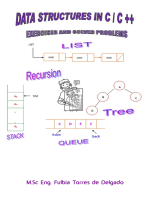JAVA 1
Uploaded by
Rohit KumarJAVA 1
Uploaded by
Rohit KumarDEPARTMENT OF
COMPUTER SCIENCE & ENGINEERING
Experiment 1.1
Student Name: Priyanshu Dhatwalia UID: 23BCS12606
Branch: BE-CSE Section/Group: 605A
Semester: 4th Date of Performance:
Subject Name: OOPs using Java Subject Code: 23CSP-202
1. Aim: Design a system where books can be borrowed and return,
modulating the relationship between book, member and library class using
inheritance and Composition.
2. Objective:
The objective of this system is to design a library management system by
applying object-oriented programming principles, specifically focusing
on:
1. Class Structure:
Define appropriate classes (Book, Member, Library, etc.) to
represent real-world entities.
Encapsulate attributes and behaviors related to each entity.
2. Inheritance:
Establish a hierarchy where common properties and behaviors are
inherited from parent classes to reduce code redundancy.
Example: A Person base class could be inherited by Member and
other types of users like Staff.
3. Composition:
Model "has-a" relationships using composition to represent how
different objects interact.
DEPARTMENT OF
COMPUTER SCIENCE & ENGINEERING
Example: A Library has multiple Book and Member objects, and a
member has borrowed books.
3. Java Code:
import java.util.*;
public class Testing {
public static void main(String[] args) {
Scanner sc = new Scanner(System.in);
System.out.print("Enter the library name: ");
String libraryName = sc.nextLine();
Library library = new Library(libraryName);
System.out.print("How many books do you want to add to
the library? ");
int bookCount = sc.nextInt();
sc.nextLine();
for (int i = 0; i < bookCount; i++) {
System.out.print("Enter the title of book " + (i) + ": ");
String title = sc.nextLine();
System.out.print("Enter the author of book " + (i) + ": ");
String author = sc.nextLine();
DEPARTMENT OF
COMPUTER SCIENCE & ENGINEERING
library.addBook(new Book(title, author));
}
System.out.print("Enter the name of the member: ");
String memberName = sc.nextLine();
Member member = new Member(memberName);
System.out.print("Enter the title of the book to borrow: ");
String borrowTitle = sc.nextLine();
library.borrowBook(borrowTitle, member);
System.out.print("Enter the title of the book to return: ");
String returnTitle = sc.nextLine();
library.returnBook(returnTitle, member);
sc.close();
}
}
class Library {
private String name;
private List<Book> books;
public Library(String name) {
this.name = name;
this.books = new ArrayList<>();
}
DEPARTMENT OF
COMPUTER SCIENCE & ENGINEERING
public void addBook(Book book) {
books.add(book);
System.out.println(book.getTitle() + " added to " + name);
}
public void borrowBook(String title, Member member) {
for (Book book : books) {
if (book.getTitle().equalsIgnoreCase(title)) {
if (book.isAvailable()) {
book.setAvailable(false);
member.borrowBook(book);
System.out.println(member.getName() + " borrowed
" + title);
} else {
System.out.println(title + " is currently not
available.");
}
return;
}
}
System.out.println(title + " not found in the library.");
}
public void returnBook(String title, Member member) {
for (Book book : books) {
if (book.getTitle().equalsIgnoreCase(title)) {
book.setAvailable(true);
member.returnBook(book);
DEPARTMENT OF
COMPUTER SCIENCE & ENGINEERING
System.out.println(member.getName() + " returned " +
title);
return;
}
}
System.out.println(title + " does not belong to this library.");
}
}
class Book {
private String title;
private String author;
private boolean isAvailable;
public Book(String title, String author) {
this.title = title;
this.author = author;
this.isAvailable = true;
}
public String getTitle() {
return title;
}
public boolean isAvailable() {
return isAvailable;
}
DEPARTMENT OF
COMPUTER SCIENCE & ENGINEERING
public void setAvailable(boolean available) {
isAvailable = available;
}
}
class Member {
private String name;
private List<Book> borrowedBooks;
public Member(String name) {
this.name = name;
this.borrowedBooks = new ArrayList<>();
}
public String getName() {
return name;
}
public void borrowBook(Book book) {
borrowedBooks.add(book);
}
public void returnBook(Book book) {
borrowedBooks.remove(book);
}
}
DEPARTMENT OF
COMPUTER SCIENCE & ENGINEERING
4. Output:
You might also like
- Empower Your Heart With Breakthrough Nitric Oxide Therapy - Tammy Hester100% (3)Empower Your Heart With Breakthrough Nitric Oxide Therapy - Tammy Hester20 pages
- Continental Diesel Engine Reference Guide: Make Fits Application Engine Details0% (1)Continental Diesel Engine Reference Guide: Make Fits Application Engine Details1 page
- Stastical Physics: The Energy DistributionNo ratings yetStastical Physics: The Energy Distribution17 pages
- Twinkl Omnivore-Carnivore-Or-Herbivore-Venn-Diagram-Sorting-Activity-Sheet - Ver - 3No ratings yetTwinkl Omnivore-Carnivore-Or-Herbivore-Venn-Diagram-Sorting-Activity-Sheet - Ver - 33 pages
- Group Alibasa X Abilul X Hajihil X LaueranoNo ratings yetGroup Alibasa X Abilul X Hajihil X Lauerano21 pages
- SyedAmielMateenbinSyedAdrinPutra ITS63304No ratings yetSyedAmielMateenbinSyedAdrinPutra ITS6330426 pages
- CS 1102-01 - AY2025-T3 Programming Assignment Unit 2No ratings yetCS 1102-01 - AY2025-T3 Programming Assignment Unit 210 pages
- Java Assignment - 2 Subjective QuestionsNo ratings yetJava Assignment - 2 Subjective Questions7 pages
- LAB 2: Classes and Objects: 1 Problem StatementNo ratings yetLAB 2: Classes and Objects: 1 Problem Statement5 pages
- Cerafica Tamares - Prolang Laboratory Activity 2 PDFNo ratings yetCerafica Tamares - Prolang Laboratory Activity 2 PDF7 pages
- Lab Assignment - 3: Fall Semester 2020-21No ratings yetLab Assignment - 3: Fall Semester 2020-217 pages
- Object-Oriented Programming (Ccs0023) : College of Computer StudiesNo ratings yetObject-Oriented Programming (Ccs0023) : College of Computer Studies32 pages
- NgRx SignalStore: An effortless solution for state managementFrom EverandNgRx SignalStore: An effortless solution for state managementNo ratings yet
- Java Programming Tutorial With Screen Shots & Many Code ExampleFrom EverandJava Programming Tutorial With Screen Shots & Many Code ExampleNo ratings yet
- Library Management System Deployment Life CycleNo ratings yetLibrary Management System Deployment Life Cycle12 pages
- "Survey On Philips Air-Fryer": Shri Vile Parle Kelvanimandal'SNo ratings yet"Survey On Philips Air-Fryer": Shri Vile Parle Kelvanimandal'S5 pages
- Installation Instructions For KLINGER Gaskets - Einbau - eNo ratings yetInstallation Instructions For KLINGER Gaskets - Einbau - e6 pages
- Removable Partial Denture With Bar or Plate How Should We DecideNo ratings yetRemovable Partial Denture With Bar or Plate How Should We Decide6 pages
- royal_enfield_himalayan_450_technical_specificationsNo ratings yetroyal_enfield_himalayan_450_technical_specifications6 pages
- Empower Your Heart With Breakthrough Nitric Oxide Therapy - Tammy HesterEmpower Your Heart With Breakthrough Nitric Oxide Therapy - Tammy Hester
- Continental Diesel Engine Reference Guide: Make Fits Application Engine DetailsContinental Diesel Engine Reference Guide: Make Fits Application Engine Details
- Twinkl Omnivore-Carnivore-Or-Herbivore-Venn-Diagram-Sorting-Activity-Sheet - Ver - 3Twinkl Omnivore-Carnivore-Or-Herbivore-Venn-Diagram-Sorting-Activity-Sheet - Ver - 3
- CS 1102-01 - AY2025-T3 Programming Assignment Unit 2CS 1102-01 - AY2025-T3 Programming Assignment Unit 2
- Cerafica Tamares - Prolang Laboratory Activity 2 PDFCerafica Tamares - Prolang Laboratory Activity 2 PDF
- Object-Oriented Programming (Ccs0023) : College of Computer StudiesObject-Oriented Programming (Ccs0023) : College of Computer Studies
- Data Structures in C / C ++: Exercises and Solved ProblemsFrom EverandData Structures in C / C ++: Exercises and Solved Problems
- NgRx SignalStore: An effortless solution for state managementFrom EverandNgRx SignalStore: An effortless solution for state management
- Java Programming Tutorial With Screen Shots & Many Code ExampleFrom EverandJava Programming Tutorial With Screen Shots & Many Code Example
- Ruby Gems Mastery: 100 Essential Packages for 2024From EverandRuby Gems Mastery: 100 Essential Packages for 2024
- "Survey On Philips Air-Fryer": Shri Vile Parle Kelvanimandal'S"Survey On Philips Air-Fryer": Shri Vile Parle Kelvanimandal'S
- Installation Instructions For KLINGER Gaskets - Einbau - eInstallation Instructions For KLINGER Gaskets - Einbau - e
- Removable Partial Denture With Bar or Plate How Should We DecideRemovable Partial Denture With Bar or Plate How Should We Decide
- royal_enfield_himalayan_450_technical_specificationsroyal_enfield_himalayan_450_technical_specifications





























































































